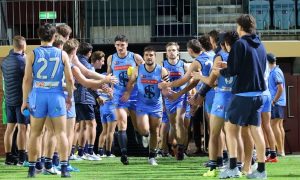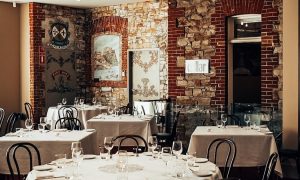 Athol Guy is a quiet, unassuming legend of Australian music. His achievement is essentially unknown to younger generations, and often under-estimated, even by those of us old enough to remember the heyday of The Seekers.
Athol Guy is a quiet, unassuming legend of Australian music. His achievement is essentially unknown to younger generations, and often under-estimated, even by those of us old enough to remember the heyday of The Seekers.
We spoke to him prior to the beginning of his tour with the show Athol Guy – The Seekers Story.
What drove Athol Guy to music?
Well I grew up after the war years, in a household that found its relief from the tension, in music. I was chained to the piano when I was about six years old, by my dear grand-mother, and she and the family would sing along, doing amazing harmonizing. Then I became a choir boy, and when my two uncles came home from the war, they had a little jazz band, and they used to practice out on our back-verandah.
The incredible thing was that, my father, who I never really knew…I only saw him two or three times in my life…and he died when I was about 14. I found out after he died that he was the double-bass player and the musical arranger in the Royal Australian Naval Band. I never knew about that before I started playing the bass. I bought a bass to play with my first Seekers band with Keith [Potger] which was morphed out of two bee-bop boy bands, not unlike the Human Natures that you see today. I had a trio called The Ramblers, and then I had a group called The Escorts. You couldn’t call a band that nowadays!
Anyway, The Escorts became The Seekers: Bruce (Woodley), Keith and I and another mate of ours by the name of Ken Ray, who had a beautiful tenor voice. Anyway, Ken got married, and he couldn’t come out and do the little gigs we were doing in the evenings, but as luck would have it, I was working in my office, in an advertising agency one day, in 1962, and this person popped her head around the corner and said “Hello, you’re Athol Guy…I’m Judy Durham. I sing with a jazz band. When are you going to come and hear me sing?” I said “We’re playing tonight, why don’t you come and sing with us?” which she did. So she came to our gig in a little coffee lounge, and she started singing one of her little folkie songs, and we joined in. No rehearsal. That’s exactly how it happened.
So given that you came from more of a jazz back-ground, as did Judith Durham, why the folk sound that The Seekers became known for?
We were getting into folk through Pete Seeger, and Peter, Paul and Mary, and Judith had an album by a band called The Weavers. She particularly loved the song “When the Stars Begin to fall”, and there was another song on that album called “Morning Town Ride” and we thought we could do something with that sound. We found a lot of traditional numbers that still allowed us to put the five-string banjo in.
We also concentrated on some gospel songs that were very much a part of our repertoire. Those songs were often the B side of our records. So I think we were just morphing into a repertoire that was particularly our own. Then we’d done two albums for the World Record Club, and we’d already done an album in Australia with Ron Tudor, by the time we got to England. We certainly weren’t regarded as a commercial group, but we were well and truly welcomed into the very big folk music scene in Scotland and also in Ireland. So we really stuck up an identity before we had a hit. But no one had filled the gap that The Springfields had left – they’d disbanded a year or so before we arrived in the UK. So when we met Tom [Springfield] he saw in us an opportunity to use one of the songs that he’d already penned. That was “I Know I’ll Never Find Another You”. And when we recorded it, even the recording engineer turned around and said “That’s going to be a huge hit”. That song took us into another stratosphere, and it changed our lives forever.
Tell us about your current show. What was the main driver to put this show together?
It was people nagging me! I keep telling little stories about the group. One day i was talking to a mate of mine who is writing some memoirs for me, for the family archives and he said “These stories you tell…why don’t’ you wrap some of them around your music and put on a little mini-musical.” And I’ve been playing for a while with my little group “Athol Guy and Friends”, and I asked them if they’d like to put on a show. So I mapped it out with bits of history of the band, video and so forth. We thought we’d play in some of the beautiful, regional theatres in Australia. We‘d done a few Morning Melodies: a truncated version of what we’re doing with this show, and I got to meet some of the loveliest Australians. They made you feel part of the family, and they told me stories about how our music had been a part of their lives. It was such a heart-warming experience. So I said, we’ll go out and meet these wonderful people and we’ll entertain them.
What do you think is the main legacy The Seekers have left Australian music?
We’d like our legacy to be that we were the first Australian band to go over, at a time when the competition was absolutely red-hot, with a sound that was totally outside the commercial sphere, and we made it, because we had the edge of difference.
You’re involved in an enormous amount of charities, but tell us about “Sing Australia”
Well, that started when we were having one of our rural recessions. And the best way to lift everybody’s sprits when a community is in that sort of shape is to get together and sing. And the team at Sing Australia got involved with a lot of professionalism went around with a catalogue of songs, and wherever a community wanted to start up a choir, they would step up and help them. I came across it about three or four years ago. It is a fabulous organization. They do trips overseas. I’ve lost track of how many choirs they have. We get a great deal of joy out of hearing the stories of individuals who have been helped.
And finally, in your life you’ve been involved in music, politics, charities and all sorts of organizations, but what is the one achievement you’re most proud of?
I think the achievement I’m most proud of is having a very normal daughter, who is 35. She is progressing beautifully in life. Sadly, she lost her mum, my dear wife, about ten years ago. I’m so proud of the way she has handled her life. Although, funnily, she wouldn’t open her mouth to sing a note, whereas her daughter, my three year old grand-daughter, is the biggest show-off you’ve ever seen. Fame is fleeing, but this is the most important thing in life.
Interview by Tracey Korsten
Twitter: @TraceyKorsten
Read our review of Athol Guy – The Seekers Story
Athol Guy – The Seekers Story SA regional tour continues this week:
- Wednesday 6th May: Middleback Theatre, Whyalla
- Thursday 7th May: Northern Festival Theatre, Port Pirie
- Friday 8th May: Chaffey Theatre, Renmark
Find out more at:
- https://www.adelaidefestivalcentre.com.au/shows/the-seekers-story/
- http://www.theseekers50th.com
- http://atholguyandfriends.com



















